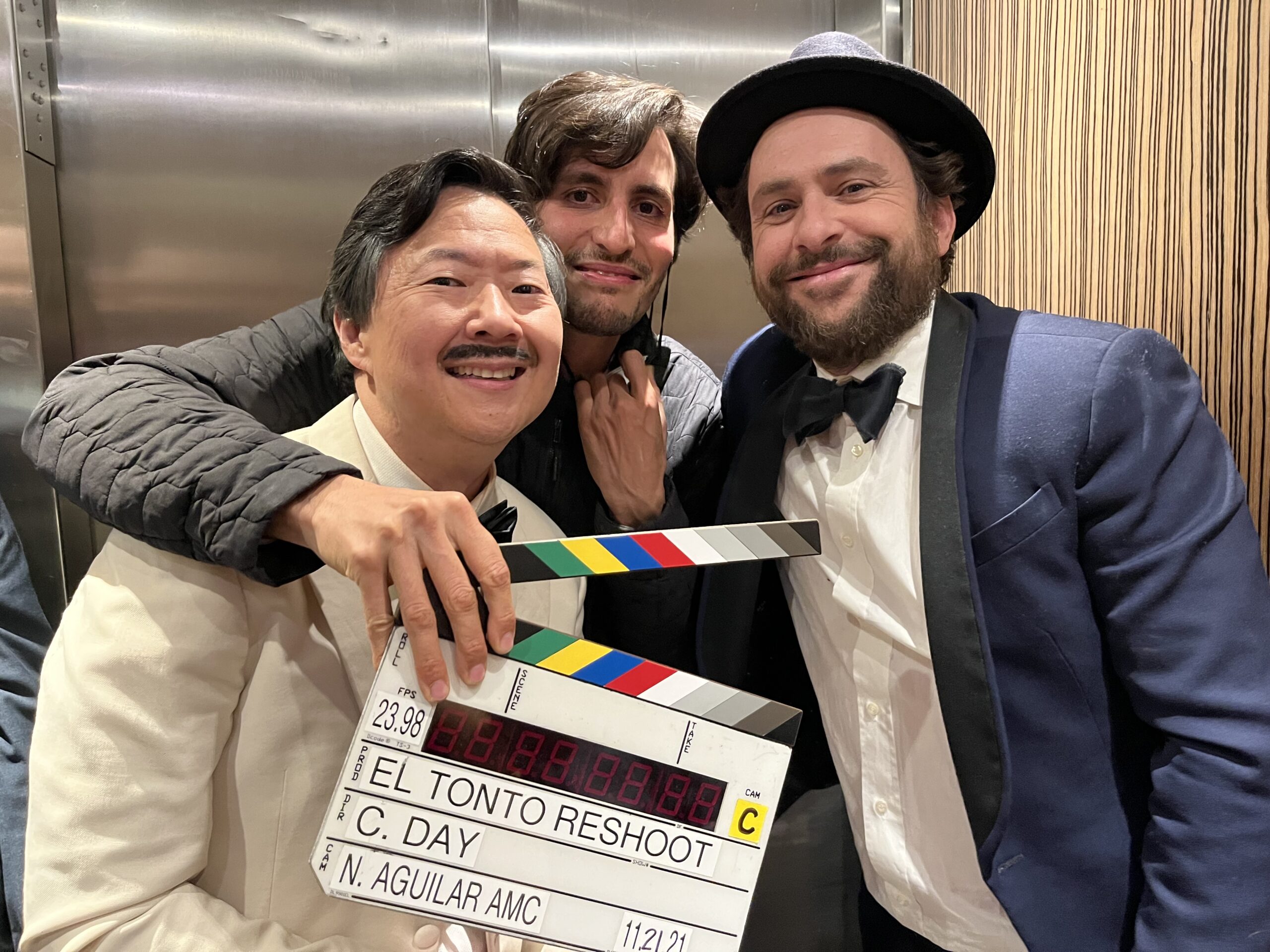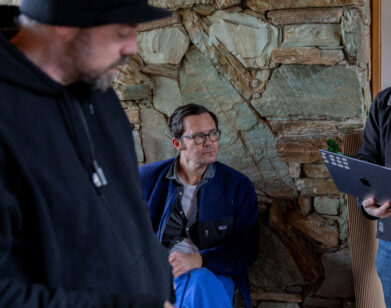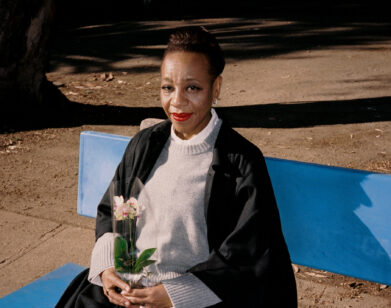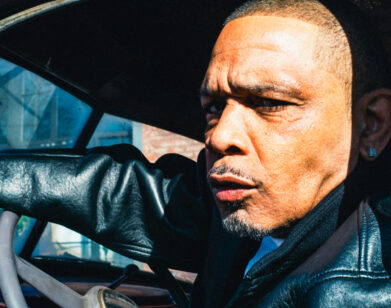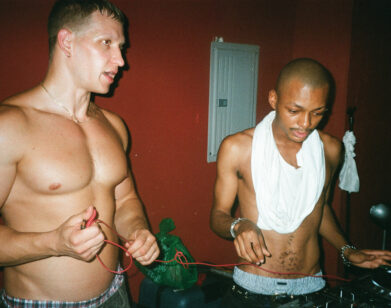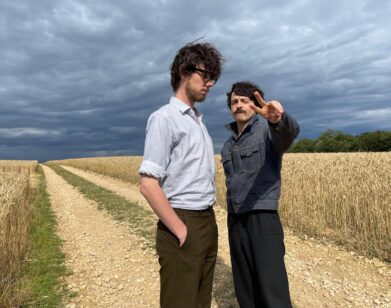IN CONVERSATION
Charlie Day and Jenny Slate Are Floating on a Raft Made of Garbage
Through 16 seasons on It’s Always Sunny in Philadelphia, Charlie Day has established himself as one of the defining comic actors of his generation. But you may not know that on set, between takes, since 2014, he was conceiving of his directorial film debut, a slapstick-heavy satire of Hollywood ambition that doubles as an affectionate ode to the movies, invoking the work of screwball comedy legends like Charlie Chaplin and Buster Keaton. Today, after nearly a decade in gestation, Fool’s Paradise hits theaters. “I’ve delivered a movie on the terms that I wanted to deliver it on,” he told his friend and I Want You Back co-star Jenny Slate, “which was surprisingly more challenging than I had ever anticipated.” Oftentimes, he told her, comedy gets siloed from other genres as a less aesthetically-minded form of art, without pretensions to beauty or transcendance. But with Fool’s Paradise, which stars Day himself alongside Ken Jeong, Edie Falco, Adrien Brody, and the late Ray Liotta, Day sought to make a film as attractive and richly textured as it is funny. Slate, who co-wrote the recently Oscar-nominated animated comedy Marcel the Shell with Shoes On, knows a thing or two about defying expectation and genre. On Zoom, as he waited patiently in the carpool line at his son’s elementary school, Day called Slate to talk about directing vs. acting, the pivotal advice he got from Guillermo del Toro, and why, now that his movie is out, he feels like he’s washed up on the shores of a sunny island.
———
JENNY SLATE: Wow, what a pleasure this is.
CHARLIE DAY: Hi, Jenny!
SLATE: I will literally talk for three hours, unless somebody tells me, so you should–
DAY: I’ll give you a good out, because I think our nanny got whatever stomach thing you had.
SLATE: Oh my god.
DAY: So I’m parked outside of Russell’s school, and he gets out at 3:00, so I’m going to snatch him up.
SLATE: Okay.
DAY: Jenny, I’m so upset. I have not seen you since you’ve been in town.
SLATE: I know. And it’s really one of the central tragedies of an otherwise really happy time for me.
DAY: We have time. I am going to England on Thursday, but I’ll be back in a week.
SLATE: Okay. I’ll be here and I won’t let you go. I really wanted to start this by saying that you really are, for me, a person who has so much blazing power and has so much restraint, which I think is so elegant. And it’s something that I’ve always felt about you, and noticed while we were working together. You can steal a scene in a million ways. But to watch something that you wrote, that you conceptualized and cherished for so long, it’s just so beautiful and so interesting and I loved it so much. I love your movie for many, many reasons. I love your movie as a person who just loves film and doesn’t want that art form to die. But I also love your movie because it genuinely is just so beautiful and it made me feel so good. You really don’t speak very much in it, as you know.
DAY: Which was kind of like a wild idea. “Boy, I’ve really doubled down on a protagonist who doesn’t want anything, and then I’m going to also not talk.” So this was a big swing, but I had Ken Jeong to bail me out of that decision.
SLATE: It seems like an homage, certainly to Peter Sellers, but also to really elegant performers from the past like Charlie Chaplin and Buster Keaton. And you really embody them too. Your physicality is so beautiful and so funny and wonderful. But yeah, I just wanted to know, why did you want to say nothing?
DAY: Well, I very unabashedly was saying, “Well, can I do Being There set in Hollywood?” That’s what I set down as the north star, knowing those movies are not going to get made anymore and wanting a chance to do a performance like that. No one’s going to give it to me. The phone’s not going to ring. It’s not going to happen. So I was just trying to create something for myself. Ken and I were filming together doing I Want You Back. I had been going back and forth and I’d had to put this movie on hold. I had to go do a season of Sunny. And then I went right into I Want You Back with you. And we were in that Covid lockdown. I was thinking about what the heart of this movie was, and knowing how you work and seeing Marcel and just how much emotion and heart you put into a seashell, I thought, “Well, can I do all the funny, over-the-top things that I want to do in this film? And could I do something more restrained by leaning more into Ken Jeong’s character?” And then it sort of reawakened in me. After we wrapped the film and I had to go into another season of Sunny and I was trying to make little tweaks in the editing room, that’s when I was speaking with Guillermo del Toro and he urged me to make those changes. But I don’t know, it’s like anything else. You just want to entertain people, and I was just wanting to give myself an opportunity to entertain people in maybe a slightly different way than I already do. But I also do talk in the movie. If you’re a fan of my voice, you get to see me as the method actor as well.
SLATE: Yeah, you do so much. I don’t want to give it away for anybody who reads this, but the one line that you do say as your character is one of the best things anybody could say to anyone else, if they really mean it. But I mean, the movie is such a gorgeous, gentle portrait of Los Angeles, which is usually a city that is depicted as powerful but gnarly, beautiful but brutal. And what I loved about the movie is that every single character in one way or another has a large amount of foolishness in them. The other thing is that your color palette and your production design is so gorgeous and it gestures back to old Hollywood. Sometimes, production design feels like it’s wearing a costume of itself. It’s just too overdone. And the way that your character walks around, he owns his walks so easily, he’s just so light on his feet, in his nothingness. Your whole film is also just so light on its feet. Its style is impeccable. The colors are gorgeous. It’s so coherent. And it’s not sappy nostalgic. You must be so proud.
DAY: I’m really happy with how it’s turned out and that I’ve delivered a movie on the terms that I wanted to deliver it on, which was surprisingly more challenging than I had ever anticipated. Because every opportunity that comes up, there’s an opportunity to cut a corner; that could be an aesthetic corner, could be a creative corner. I wound up getting to work with John Brion on the score. And we have a full orchestra. And we’re in the old Sony stages where they recorded the music for The Wizard of Oz and John Brion wanted to use old microphones to record the sound. And just having the patience to say, “Look, for this movie, this is the least economical… smart choice.” But I think it pays off. I think the audience deserves it. Oftentimes, with comedy especially, people think, “Well, it doesn’t have to be beautiful. We can dismiss beauty and we can just shoot funny.” And sometimes that’s fine. It’s Always Sunny in Philadelphia is a good example of, we’re not really trying to make something pretty. But for this particular film, because I was commenting on movies through the ages, I wanted it to be as funny as it could be, but I also wanted an aesthetic that felt more timeless.
SLATE: You definitely had that. The synergy was certainly there. And this is a stupid question, but… I actually don’t have the urge to direct at all. I really just want to keep acting in things. Mostly because I don’t love being in charge, or it’s a hard enough job to just be in charge of myself as I’m alive and keep her in gear. But do you like one more than the other? Or does it matter?
DAY: So much of what Rob and Glenn and I do on Sunny is very similar to the job of directing a movie, where you’re casting the show and you’re choosing the props and you’re having the final say in the editing room and on the locations. And then we had the great fortune of working with so many talented directors that we could simply let them do all the work. So it was such a gentle way into learning how to do that without all the pressure being on your shoulders. I find that I like existing in both things. But yeah, you want to just act. I’ll put you in a movie. Will you be in one of my movies?
SLATE: I was holding myself back. No one likes to be a beggar. But I’ve really held myself back and stopped myself. But now I’m doing it, like, “Please let me be in your next movie. Please let me be in your next movie.”
DAY: Absolutely, 100%. As you and I both know, I’m dying to work with you again. So maybe I’ll just have to write the damn thing. I mean, that’s always what happens to me. I’m just waiting for something to come along and I’m just impatient. And then I think, “Well, then I’ll just do it myself.”
SLATE: How long did you have this idea?
DAY: My first notes on it, and I have them on my phone, are from 2014.
SLATE: Oh, wow.
DAY: Yeah. I think by the end of that year, I had a draft and wasn’t ready to make it. I wasn’t like, “Here we go, let’s make it,” but just starting to share it with a few people and doing some tweaks. And then by 2017, I was really like, “Okay, can I find the money to make it?” Which was challenging because it’s not a Marvel movie. It’s an old school movie. But by 2018, I was in production. I had wrapped in 2019 and had been cutting for most of that year. And then the pandemic hit, I had to go back to Sunny, then I went into I Want You Back. Then I went back to Sunny, and then I did a re-shoot. And then I finished cutting with Leslie Jones, who’s an incredible editor. So I haven’t been working non-stop on it, but I’ve been working on it on and off for a decade, which is nuts.
SLATE: After we made I Want You Back, we were talking on the phone the summer after that, just keeping in touch. And I remember you talking about wanting to make changes and really wanting to come out with the story that you want to tell and the look that you want and the representation of your original idea. I mean, you set the bar really high now because the movie came out so beautifully. When I was making Marcel, I was like, “Oh, I don’t have an issue with being earnest as long as it’s not sappy.” And I want to create work now that is the equivalent of a gorgeous public pool that anyone could be in. How many people could come here and be in here and think that it’s just for their own private experience? But that’s what I want. That’s what feels good to give out.
DAY: Did you feel this with Marcel, where there’s a version of the movie that exists and you’re just trying to almost wipe away paint or whatever, instead of building, you’re almost trying to clear stuff out to get to that movie? That the movie has a central truth that works and speaks and that if you can just get out of the movie’s way and listen to it, you can do as much as you want?
SLATE: I often find that part of what is going on for me is fixating on something that I think is the thing, and it’s not the thing. And having to accept that that’s not wasted time. There were many different versions of Marcel, and one of them was a version where it was more about him, this got cut out. But Marcel, before his family got taken away, went to this place called The Academy of Tunes where he was training to be what we called a “community singer.” It’s sort of the cantor in a synagogue. First it was about him being a performer, and I was like, “I don’t really have a lot of questions actually about myself as a performer.” I know I want to be one. I know what it’s like. But I had a lot more to investigate. And I think Dean Fleischer Camp, the director, my ex-husband as well, we both had a lot of questions about what it looks like when you’re going through loss. And that just sort of emerged after focusing on this other thing for a while. I don’t find it that hard to cut, but I find it really hard to amass the material. How do you feel about the blank page?
DAY: I mean, it’s ever-evolving, right? With this movie, if the initial instinct was satirizing Hollywood, it weirdly became more about… There’s a line the doctor says in the beginning of the movie. My character’s lost the ability to communicate and he has the mind of an innocent or a child. And he says, “If he can have one meaningful connection, he can perhaps break free of this.” And then I also had Ken’s character, who desperately wants to make a name for himself in Hollywood. And both of them are simply seeking one meaningful relationship. And I had no idea starting the movie that ultimately it was going to be about these two men wanting to have a meaningful relationship with one another. And that it could be both really funny, but also very human and real. So that might have all been a non-sequitur answer to any certain question you may have posed, but…
SLATE: No, no, not at all. I love that the central relationship is just between these two people who are so different, just because of what they’re able to express in the world and what their needs are. But they both affect each other in a way where they reach both connection and equilibrium or awareness. And I do think that it’s a lovely statement to make as an artist that it’s just not worth much to see people as a means to an end. But that, if you are able to make a connection, a real true one, and really, really love another in a human to human relational love, that it actually has such high worth.
DAY: I find that it became the central theme of that movie. How do you relate to your child, or both parents, and of course the love you’re feeling for your kid is unlike any other love you had before. It’s a whole new way of relating. And how do you and I relate to each other and just how fulfilling that has been. I don’t have too much interest in say, writing a movie like Star Wars. I like seeing them and I’ll go sit in the theater, but I don’t really want to spend hours sitting and dreaming of creatures.
SLATE: In my mind, as just a stranger or a fan, I always thought of you as like, “Oh, he has the comedy it-factor the way that Will Ferrell has it. It’s just never going to be bad. It’s always good. He’s really good at comedy and he’s really special.” And I was paired with you in I Want You Back and I was so flattered. And I had had a baby 10 weeks before we started, and I was like, “I don’t even know if I properly exist.” And I was always startled by the fact that even in making a lighthearted rom-com, everything felt really real, and it had its own natural pulse to it. And so it really legitimized me as an actor just to be able to work with you and see how good you were. But also just sitting on set with our masks on, to be able to make a new friend and be literally visible like, “Oh, he sees me. I appear here.” And we’re making a friendship. And these experiences, they’re really the jewels, I think.
DAY: Well, okay, first of all, that was a big heap of compliments, and I’ve got to give them back to you. I felt the same way about you. And I had seen Obvious Child and knew that you were a tour de force of both drama and comedy. Of course, I don’t see myself the way that you very gracefully describe me, but–
SLATE: One of us has to.
DAY: Yeah, one of us has to. I like hearing it, for sure. But no, I felt the same. And I really think there was something about that time with you that really helped me see this project through in a different way. I took as much of that as I could and put it into this movie when I went back in with Ken and said, “We’re going to be hilarious constantly, but I’m going to just try to put a lot more emotion and put this movie’s feet on the ground.” And it transformed the film. I think those connections, they feel real. You might be watching Fast and Furious 10 and be like, “Yeah, I don’t know if these guys are all best friends.” But you watch Raging Bull and you’re like, “That Scorsese and De Niro, they have chemistry.” So just trying to find that chemistry, that’s the sort of magic we’re trying to seek out constantly, and then mix in a couple good fart jokes. And you’ve got a home run.
SLATE: That’s what I always say. Just a couple of great fart jokes and you’re done. That’s a wrap.
DAY: Yeah. I’m not above that either. I like them both. I think they can coexist.
SLATE: In fact, it actually makes me really cranky when people don’t like fart jokes.
DAY: I do want to say, to be clear, there are no fart jokes in the film. There’s some language.
SLATE: Your voice is so satisfying and wonderful, and it’s such a big move to not really use it very much. But it was nice that we got to hear it a little bit at the start.
DAY: Well, I appreciate that. Sometimes I worry my voice is like cilantro where certain people love it and then maybe others not so much. But hey, what are you going to do? You can’t please everyone. Of course, they’re wrong. Cilantro’s delicious.
SLATE: Well, it’s a funny thing for you to say, Charlie, because the first time I had lunch with you and Mary Elizabeth [Ellis, Day’s wife], she said, “No cilantro.”
DAY: That’s true. You have a good memory. She doesn’t care for the cilantro.
SLATE: No cilantro and no cucumbers, I feel.
DAY: Wow. I have no idea what you guys didn’t want to eat on your lunch plate. Well, actually, I do know. You don’t like avocado and–
SLATE: I’m allergic.
DAY: Shrimp.
SLATE: That’s right.
DAY: So no ceviche for you guys.
SLATE: Nah, not in this house. No way.
DAY: Jenny, outside all this interview stuff, I’m sorry that we haven’t gotten to hang out since you’ve been in town. But you’ve been very busy with your Oscar campaign and whatnot.
SLATE: Yeah. It’s over now. And then I got a crazy virus, but now I really am better. I’ll text you. But also I wanted to ask if you would come and see one of my standup shows before I go to film my special.
DAY: Oh my god, absolutely.
SLATE: It’d be nice to have some friends in the audience. I’m doing a couple shows around town before I’m going to go film it at BAM in Brooklyn. I don’t feel ready at all, but it is sold out, so I have to show up and do it.
DAY: Yeah. Totally. But that’s what we do. To do this job is to constantly throw yourself into situations and think, “Oh boy, this could go wrong.” And then to just swim as hard as you can and just hope you reach dry land.
SLATE: Yeah, I know. A lot of time at sea, though. Just feels like I’m sitting on a raft made of garbage.
DAY: A lot of time at sea. But now I feel like I’ve washed up on the shores of an island that I want to be at, instead of just being like, “Well, I cobbled together a trash barge.” I feel very happy with the result. And then I go back and forth, I’m like, “Am I really going to do this to myself again at some point?”
SLATE: Yes, yes. The answer is yes, you’ve got to do it.
DAY: The answer is yes. Just like you’re going to keep doing standup, which I’ve never done in my life and would be terrified to do.
SLATE: Yeah. But every time it’s absolutely horrible. It feels like I’m a surfer who’s really afraid of the ocean. It’s like I want to surf, but I’m so afraid of the waves. But there’s also deep rewards and it’s a transcendent feeling to truly care about something or someone and to serve it. But I guess this is just what I want to throw my weight behind, or something, whatever they say.
DAY: That’s it. Well, let’s combine our weights and throw it behind stuff soon. And I deeply care about you, my friend.
SLATE: I love you so much, Charlie, and I’m so happy for you. And you so entertained me with this movie. I smiled and I felt warm and happy and curious the whole time.
DAY: Well, I love you too. And let’s find some time to get together. I’m going to go snatch up the kid I love. I’m going to embarrass him.
SLATE: Oh, good.

